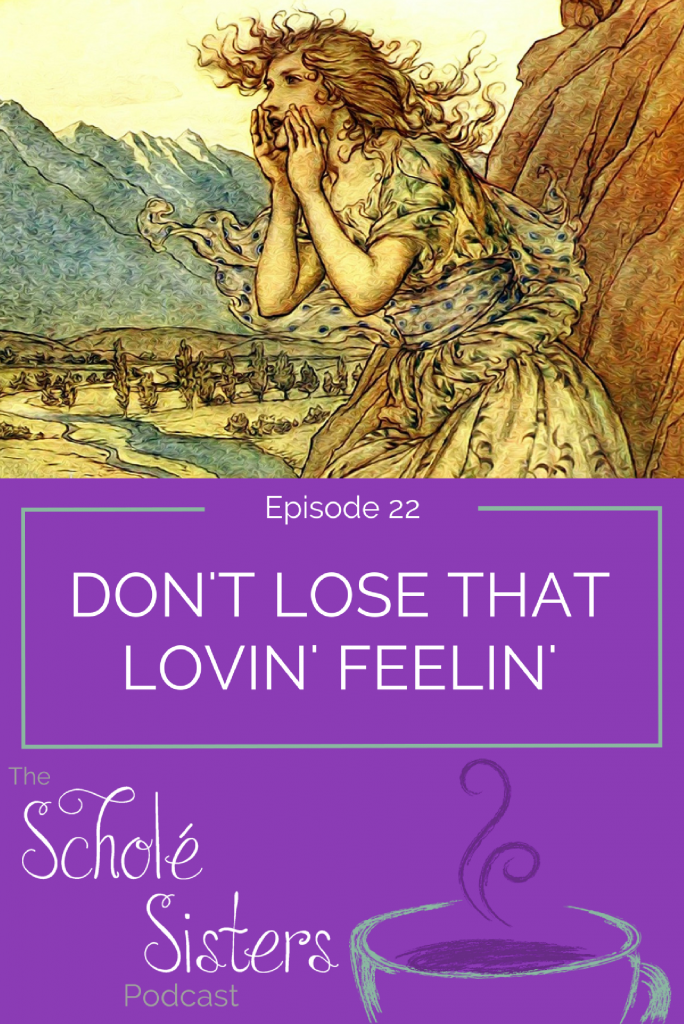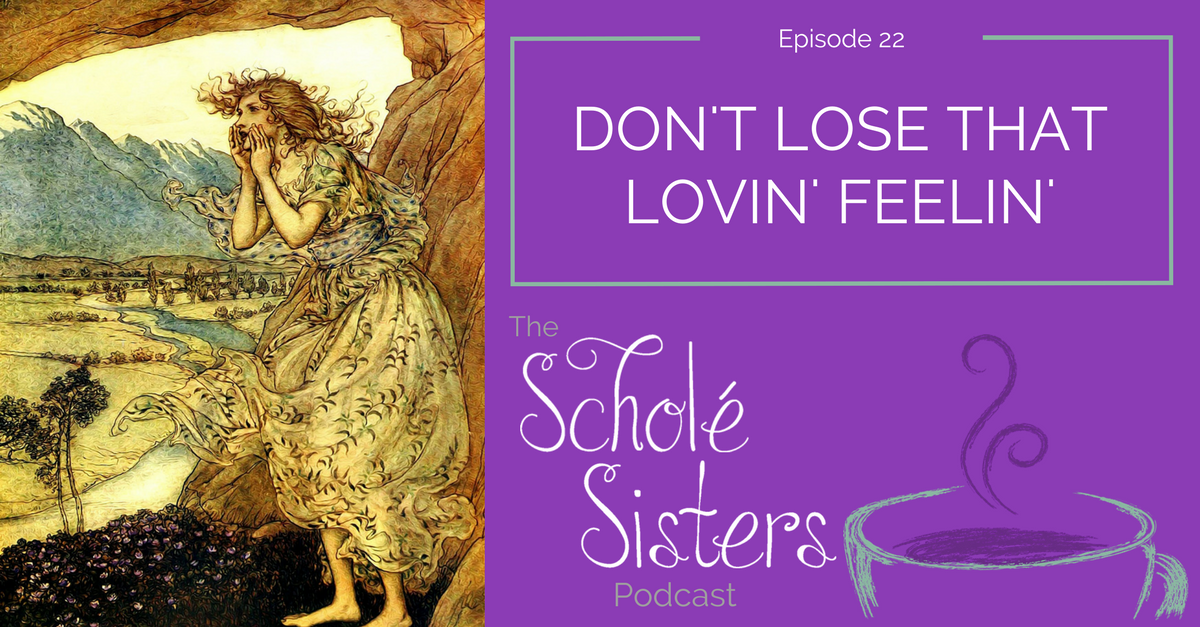SS #22: Don’t Lose That Lovin’ Feelin’
For today’s episode, we had quite the discussion surrounding the idea of interest and being interested – what does it mean, are we born interested, how do we lose interest over time, how do we gain it, what do we do when our children aren’t interested? We talked about a lot!

Thank you to our sponsor:
This episode is sponsored by Teaching Reading with Bob Books. Teaching Reading with Bob Books is a line of printable phonics lessons that is 100% gimmick-free. The goal of the Teaching Reading with Bob Books method is to teach reading as simply as possible– it aims at that little space in your day where reading muscles are grown—the key ten to fifteen minutes of instruction that can change a child’s life. Use the discount code sisters to get 15% off at checkout.
Listen to the podcast:
Podcast: Play in new window | Download
Show Notes:
- Scholé RDA
- Pam
The Living Page: Keeping Notebooks with Charlotte Mason by Laurie Bestvater
- Dawn Garrett: Ladydusk
- Voxer app
At Home in Mitford by Jan Karon
- Mystie
- Nature journal
- Brandy
The Four Adventures of Richard Hannay
The Daughter of Time by Josephine Tey (also mentioned)
- Pam
- Topical Discussion: DON’T LOSE THAT LOVIN’ FEELING’
Beauty in the Word by Stratford Caldecott
A Severe Mercy by Sheldon Vanauken
Home Education by Charlotte Mason
Life of Fred
Richard Halliburton’s Book of Marvels
For the Children’s Sake by Susan Schaeffer Macauley
- Charlotte Mason Boot Camp
- Nitty Gritty Homeschool Question
Please leave us a review in iTunes!
If you don’t know how to do that, click here for illustrated instructions.
Want to ask an upcoming Nitty Gritty Homeschool Question?
We now have two options! Go fill out this handy little form OR leave a voicemail and your question might be featured on a future episode of the show!
















So, so good! As usual a podcast that could be immediately restarted and listened to again. I especially appreciate all the thoughts about not “just finishing” since I sometimes get to thinking that I should “plow through” something. Plowing would destroy all my little seedlings, wouldn’t it?
Ooh! I like that plowing/seedlings analogy! SO true!
I was quite enamored with it myself;) My brain has been mulling on it ever since and I was definitely thinking in the vein of “planting seeds in soul” not “children are plants”, since I think that was a CM(?) thing that children are NOT plants. My two first thoughts:
1) Is there ever a time for ploughing? What does it look like in HS?
2) Thinking of the siren song of a tidy, completed workbook, “She ploughed a perfect rectangle and called it…Education.”
They’ve all been good, but, I my goodness!! I just loved this one so much! I laughed out loud at hearing the deep South in summer compared to hell and I was so encouraged to keep on keeping on! Thank you ladies! Getting ready to hit play again since no one else is home!!
This podcast reminded me of something I heared recently by John Piper. He was asked how to overcome the superficial way of living. This is a small portion of what he touched on which went along with you ladies talking about the lack of interest being the product of the Fall.
“The epidemic I’m talking about is the tragic loss of wonder and amazement, and all joyful discovery of beauties and glories in the world and in the word and in our own selves — the loss of it. Human beings really are glorious creatures, made in the image of God (Genesis 1:26–27), full of potential to know God and to know things the way God knows them and feel with the affections that even God has in his own heart.
Yet we are, as one author put it, glorious ruins. We have fallen, and one of the great evidences of our fall is that we are so easily bored with glorious reality”(desiringgod.org)
He later gave advice as to how to cure this and it had to do with repenting in prayer and asking God for the gift of wonder. He also then went on by emphasizing on the Bible and the state of wonder. He suggested the readings of the Puritants like Owens, newton, Edwards, Bunyan and others.
The “tragic loss of wonder” — my, isn’t that beautifully put? And it’s SO true … and so sad! I suppose that is the real work of our lives, hm? To recover that wonder, in the sense of coming to a plae of true worship…
Thank you for laughing with us, Sharron! ♥
First of all … LOVE your number 2 there! And second … it seems like there would *have* to be a time for plowing … I’m just not sure what that would look like…it’s interesting to think about!
Pam mentioned reading throug The Living Page with Dawn Garrett. Is that something they’re blogging or just doing together?
I don’t think I’ve seen them blogging it — I think they are just discussing it privately. Shall I tell them to blog it? 😉
What does RDA stand for? As in “Schole RDA”?
I just finished “The Daughter of Time”. Thank you for introducing it to me!
Ha! It is taken from nutritional recommendations: Recommended Dietary Allowance. 🙂 So basically, here’s our recommendation for mental nourishment. 🙂
You’re welcome! I’m so glad you enjoyed it!
I think the questions asked in this podcast are crucial for education. The phrase, “the lack of interest we feel as adults” is very convicting. We want our kids to read classics, but are we reading more challenging classics on our own in our free time? Do we really do art outside of education? I think kids pick up on our lack of true interest quickly. I would want to push back on the distinction between ‘interest’ and ‘enthusiasm’. The discussion of acknowledging something has value to be studied is only tangentially related to the core idea of interest. Interest is of that presence of an inner desire to figure something or participate in something. To say a phrase like, “I love my spouse and they love nascar, so that subject must have some value” I think side steps the issue. First, both kids and adults acknowledge the ‘value’ of a subject (i.e. “Don’t you realize how important reading is for your future!”), but that doesn’t make it any easier to teach. Second, and this is fleshed out brilliantly in James K. Smith’s book “Desiring the Kingdom”, human beings are not fundamentally ‘thinking’ beings, but desiring creatures. Most adults and many kids would recognize that algebra has value, but still not ‘want’ to do it. The attitudes you discuss in this podcast are not related to ‘thinking’ differently about subjects, but ‘feeling’ differently about them. This is way too long of a comment, but one quick example and then a pithy quote (that way it sounds more classical too). You don’t need to teach a kid to love reading, teach them to love story. My daughter, who did not pick of reading quickly or easily, has long since forgotten about the struggles of learning to read because she was so driven to hear good stories. Before she could read she had already wept at Gandalf’s death in “Lord of the Rings” and danced around the house the next day when Gandalf came back. Of course, there are other desires that can drive learning to read, but reading is only a means to a better end. Or as Antoine de Saint Exupéry may have said, “When you want to build a ship, do not begin by gathering wood, cutting boards, and distributing work, but rather awaken within men the desire for the vast and endless sea.”
That quote! That beautiful quote! I adore this, Tessa. ♥